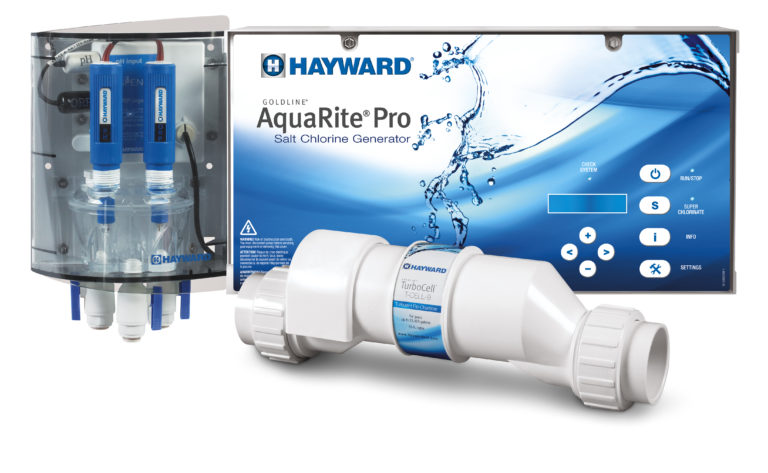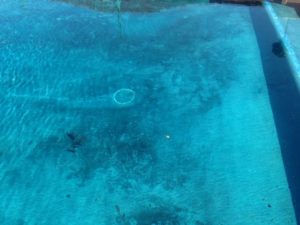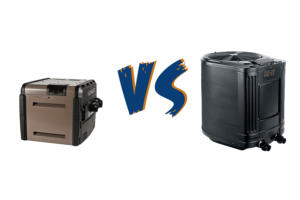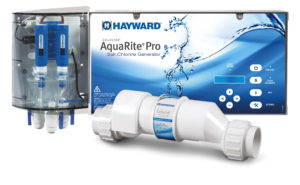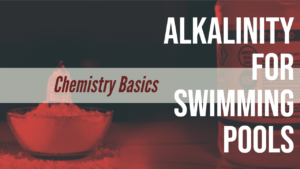What Does A Salt Generator Do?
Salt pools have a number of benefits over traditionally chlorinated pools. Regular storage and exposure to chlorine is problematic for most homeowners. Even the transportation of chlorine can pose hazards for your vehicle as well as yourself, Just look at the back of a pool truck to see that.
We want you to understand all the benefits as well as dispel some myths about salt pools, like the idea that they’re somehow more corrosive than “regular” pools.
They produce their own chlorine
On a regular service schedule, chlorine levels are graphed as peaks and valleys. We add chlorine in liquid or solid form to dissolve into the water, that works to keep your pool clear and depletes over a short time. Sometimes this is called shocking and you can learn about that here, and it’s an effective chlorination method. Its main drawbacks though are that it requires a degree of timing to be effective, and there’s a period of “down-time” where you must remain out of the pool for your safety.
Salt Chlorinators however do not operate with these peaks and valleys. It keeps the level of chlorine constant by essentially drip-feeding the chlorine it produces. Many even have a super chlorinate setting to shock the pool should you require it.
It’s easy to adjust chlorine levels
You can continue using the same test kits and test strips to test the water as your pool is still a “chlorine pool”. The difference now though is when adjusting your chlorine level you will change the output setting on the salt system as opposed to adding your chlorine of choice
It’s easier to manage your stabilizer
A common problem for non-salt pools is high levels of stabilizer from the overuse of chlorine sticks or tabs. This is a very dense topic but sticks contain stabilizer and overuse can yield stabilizer levels over 100ppm where choline can become significantly less effective.
A salt system directly replaces any in-line chlorinator, off-line chlorinator, blue bobbers and rubber ducks in your pool. It does their job better with finer control and more flexibility.
The water is much softer
This is something most people rave about once switching. For years saltwater baths have been used to help people with skin irritations, and even burn victims to help relieve pain and aid in the skin cleansing process. Now the salt level in a salt pool is not to the level used in these examples but the water is noticeably softer and more pleasant to swim in.
Some Things To Consider Before Buying
After understanding the benefits most people are ready to jump into a salt system but there are a couple of things to note before you splash the cash on a new salt system.
Salt chlorinators only affect chlorine
A lot of salespeople will wrongly say your pool becomes chemical-free. A salt system only produces chlorine. Things like Ph, Alkalinity, Stabilizer, Phosphates, etc. must still be managed.
A recommendation we like to make is if you really the BEST out of a salt system, invest in a sense and dispense acid feeder. It does all of the math on Ph management for you and it’s also a drip feed system. Meaning there’s no down-time where you’ll need to stay out of the pool and you can fill one large container with a diluted acid solution and let the system do the management itself, with you just needing to monitor the equipment and test the chemistry.
Water loss is detrimental
Negative edges, waterfalls, fan sprayers & deck jets are all points of water loss. If you’ve got any of these we recommend monthly testing of your pools salt level to ensure you aren’t losing salt from the pool.
Some systems are able to test the salt level on their own but we highly recommend something like a salt test strip. We’ve found them to be more reliable over our decades as a swimming pool service contractor.
Myths & FAQ
The salt level in a pool is less than that of a tear so most people will not taste it.
No. Salt pools all operate under 6, 000 ppm salt which is the point where water becomes corrosive to metal. Stay under 6,000 and you’ll have no problems.
Most salt systems operate between 3000-4500 ppm salt. To raise 10,000 gallons of water to 3,000ppm salt will take 240 lbs of salt.
Yes. Salt pools are chlorine pools still. They just make their own chlorine.
It should be very infrequent unless you are draining your pool often or have an excessive bather load. Often once or twice a year is all that is necessary and sometimes even less frequent.

